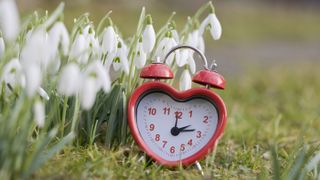Why daylight saving time starts Sunday
Why Sunday and why at 2 a.m.?

Don't forget to move your clock forward an hour overnight Saturday (March 12), as daylight saving time begins Sunday. And yes, this is the time change that takes an hour away from your day, but spring is on its way.
Daylight saving time (not savings, as many people say) begins at 2 a.m. local time on Sunday, March 13. "Smart" devices may change time automatically, manual clocks don't, so make sure to move them an hour ahead, from 2 a.m. to 3 a.m.
Why are we "springing forward" on Sunday? Daylight saving time (DST) is designed to provide an extra hour of evening sunlight, and so the clocks will remain in DST for eight months until Nov. 6, when daylight saving time ends for the year.
The father of DST, Benjamin Franklin proposed the idea in 1784 as a way to conserve energy, said David Prerau, author of "Seize the Daylight: The Curious and Contentious Story of Daylight Saving Time" (Thunder's Mouth Press, 2005). The idea was that people would spend that extra hour of daylight outdoors, rather than sitting inside, wasting energy on lighting and energy-sucking appliances, Franklin reasoned.
However, science has not provided absolute evidence to support the idea that daylight saving translates into energy savings, according to several studies, including a 2007 Department of Energy study and a 1997 study on a residential home in Kansas, Live Science previously reported. Research published in November 2021 in the journal Energy Reports suggested the springtime clock changes did not equal energy savings; in that study, scientists examined energy consumption in Turkey before and after the country stopped following DST changes in 2016. The researchers noted the findings should also apply to the U.S. due to its location within a similar latitude range.
Even so, Franklin's idea spread in the 20th century. In 1908, a city in Ontario, Canada, became the first modern region to officially implement DST, according to timeanddate.com. The Germans began following DST in May 1916, with the goal of conserving fuel during World War I. The rest of Europe followed suit soon after, and the United States officially adopted daylight saving time in 1918.
However, American farmers objected to the change, since it eliminated an hour of their morning light; in fact, it's a myth that daylight saving time helps farmers. So, the country dropped the time change until World War II, and only a select number of states chose to follow it after the war's end.
Sign up for the Live Science daily newsletter now
Get the world’s most fascinating discoveries delivered straight to your inbox.
Because daylight saving time was practiced at different times in different states, it threw the country's time zones into disarray. It wasn't until the Uniform Time Act of 1966 that daylight saving time acquired a standard start and stop time — although states themselves can choose whether to participate.
But why Sunday and why at 2 a.m.? That day and time were chosen to have the least impact on individuals. It’s late enough that most people will be home, and very few bars and restaurants should be impacted. In addition, when you move your clock at 2 a.m., you are not switching to another day; it would be confusing if the clock change occurred at say 11:30 p.m., because you would then be moving to the wee hours of the next day. The time switch also happens early enough that early-shift workers or churchgoers shouldn’t be impacted, according to the WebExhibits, an online museum.
Currently, two U.S. states — Hawaii and most of Arizona (with the exception of the Navajo Nation) — don't observe daylight saving time.
Every year, several states put forth bills or voter-led initiatives to ditch daylight saving time. However, it's anyone's guess whether these bills will become enforced law. Until then, don't forget to wake up an hour earlier on Sunday, unless you want to be late for brunch.
Editor's note: This article was first published in 2019 and updated on March 12, 2022. Originally published on Live Science.

Laura is the archaeology and Life's Little Mysteries editor at Live Science. She also reports on general science, including paleontology. Her work has appeared in The New York Times, Scholastic, Popular Science and Spectrum, a site on autism research. She has won multiple awards from the Society of Professional Journalists and the Washington Newspaper Publishers Association for her reporting at a weekly newspaper near Seattle. Laura holds a bachelor's degree in English literature and psychology from Washington University in St. Louis and a master's degree in science writing from NYU.
